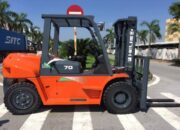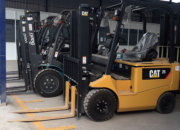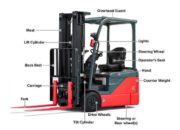Types of Container Handler Tires: An Expert Guide to Pros, Cons, and Selection
In the bustling environments of seaports, depots, and logistics centers, container handlers (Reachstackers) are the backbone of the entire operation. Operating continuously under loads of tens of tons, every component of these machines plays a critical role. Among them, the tires—the only part of the vehicle in contact with the ground—are a decisive factor for safety, performance, and operating costs.
Choosing the wrong type of tire is more than just a poor purchasing decision. It can lead to a cascade of costly consequences: soaring replacement and maintenance expenses, increased safety risks, and most importantly, machine downtime that disrupts business operations.
With extensive experience in supplying heavy-duty forklift equipment and spare parts, Samcovina will provide a detailed analysis of each type of container handler tire, clarifying their advantages and disadvantages, and offering invaluable professional advice to help your business make the optimal choice.
- Common Types of Container Handler Tires
The market currently offers two main types of tires for container handlers: pneumatic tires and solid tires. Understanding the construction and characteristics of each is the first step toward making the right selection.
- Pneumatic Tires
This is the traditional type of tire, consisting of a rubber casing, reinforcing ply layers, and an inner tube filled with compressed air.
Detailed Construction:
Bias-ply: The structure features multiple layers of fabric plies placed diagonally, creating a thick and extremely rigid sidewall that offers excellent resistance to cuts and punctures on the side.
Radial: The ply layers are arranged perpendicular to the direction of travel. This design allows for a more flexible tread, which improves heat dissipation during operation, resulting in a smoother ride and a longer lifespan for long-distance travel.
Advantages:
Superior Shock Absorption and Cushioning: The internal air cushion acts as a natural shock absorber, effectively mitigating vibrations from uneven surfaces. This not only protects the operator’s health but also reduces wear and tear on the vehicle’s components.
High Traction and Grip: The flexible tire surface maximizes the contact patch with the ground, providing excellent traction on rough surfaces, outdoor yards, gravel, or damp terrain.
Lower Initial Investment Cost: Compared to solid tires, the purchase price of new pneumatic tires is typically lower, helping to optimize the initial investment budget.
Disadvantages:
Susceptible to Punctures: This is their biggest weakness. Sharp objects like nails and metal debris commonly found on work sites can easily cause flats or blowouts, leading to sudden operational halts.
Requires Regular Maintenance: Tire pressure must be checked and maintained at the recommended levels. Under-inflated tires lead to rapid wear, increased fuel consumption, and potential safety hazards.
Cost of Production Stoppage: The downtime required for patching or replacing a tire can severely impact work schedules and productivity.
- Solid Tires
Solid tires, as the name implies, are molded from a single, durable rubber compound and have no inner tube or air. They are the perfect solution for the harshest working environments.
Advantages:
100% Puncture-Proof: They are completely immune to sharp objects, entirely eliminating the risk of downtime due to flat tires.
Extremely Long Lifespan: The solid construction provides excellent resistance to abrasion, cuts, and chunking, resulting in a significantly longer service life compared to pneumatic tires.
Maintenance-Free: They eliminate the need for routine pressure checks and inflation, saving time and labor costs.
Maximum Stability: They provide an exceptionally stable platform, minimizing vehicle sway when lifting heavy containers to great heights, thereby significantly enhancing safety.
Disadvantages:
Poor Shock Absorption: All vibrations from the ground surface are transmitted directly to the vehicle and the operator, causing fatigue and potentially accelerating the wear of other mechanical parts.
Limited Traction on Rough Terrain: They perform less effectively on uneven surfaces, soft ground, or slippery conditions.
High Initial Investment Cost: The upfront cost of a set of solid tires is considerably higher than that of pneumatic tires.
Heavy Weight: Their weight increases the overall load of the vehicle, which can slightly impact fuel consumption.
- Four Critical Factors for Selecting Container Handler Tires
To make an informed decision, Samcovina recommends a thorough evaluation of the following four factors.
- The Vehicle’s Operating Environment
Outdoors, uneven, rough surfaces (ports, unimproved yards, etc.): Prioritize Pneumatic Tires to ensure the best shock absorption and traction.
Indoors, warehouses with smooth, flat concrete floors: Solid Tires are the perfect choice to maximize lifespan and eliminate puncture risks.
Environments with a high concentration of metal debris or scrap: It is mandatory to use Solid Tires to ensure uninterrupted operations.
- Frequency and Intensity of Operation
Continuous 24/7 operations: Solid Tires will minimize downtime, ensuring maximum continuity and productivity.
Frequent, long-distance travel: Pneumatic Tires (Radial type) are advantageous due to their superior heat dissipation, reducing the risk of overheating and tire failure.
- Load Capacity and Lifting Height
Regularly lifting extremely heavy containers to maximum height: Solid Tires provide superior stability, reducing vehicle sway and ensuring absolute safety for both the operator and the cargo.
- Budget and Total Cost of Ownership (TCO)
Limited initial budget: Pneumatic Tires have a lower upfront investment cost.
Long-term cost optimization: A comprehensive calculation is necessary! While the initial cost of solid tires is high, they save on repair costs and downtime, and they have a longer lifespan. In harsh environments, Solid Tires often have a lower Total Cost of Ownership (TCO).
- Samcovina: Your Trusted Partner for Comprehensive Tire Solutions
Understanding that every business has unique needs, Samcovina is not just a leading forklift supplier but also an expert in spare parts, especially tires for heavy-duty machines like Reachstackers.
Diverse, Genuine Products: We offer a full range of pneumatic and solid tires from world-renowned brands, compatible with all the machine lines that Samcovina sells and rents (imported from Europe, USA, Japan, South Korea, etc.).
In-depth Expert Consultation: Our technical team will conduct an on-site assessment of your working environment and recommend the most suitable tire type to optimize performance and costs.
Professional Support Services: Samcovina provides replacement and pressing services for solid tires using specialized hydraulic presses, ensuring your vehicle is back in operation as quickly as possible.
Real-world Case Study: One of our clients operating at a port in the Ho Chi Minh City area reduced their tire-related costs by nearly 30% and minimized unscheduled downtime by 90% after switching from pneumatic to solid tires based on Samcovina’s recommendation.
Are you debating between pneumatic and solid tires? The wrong choice can lead to significant unnecessary costs.
Contact the experts at Samcovina today via our hotline for a free consultation and the best quote for your container handler tires!







